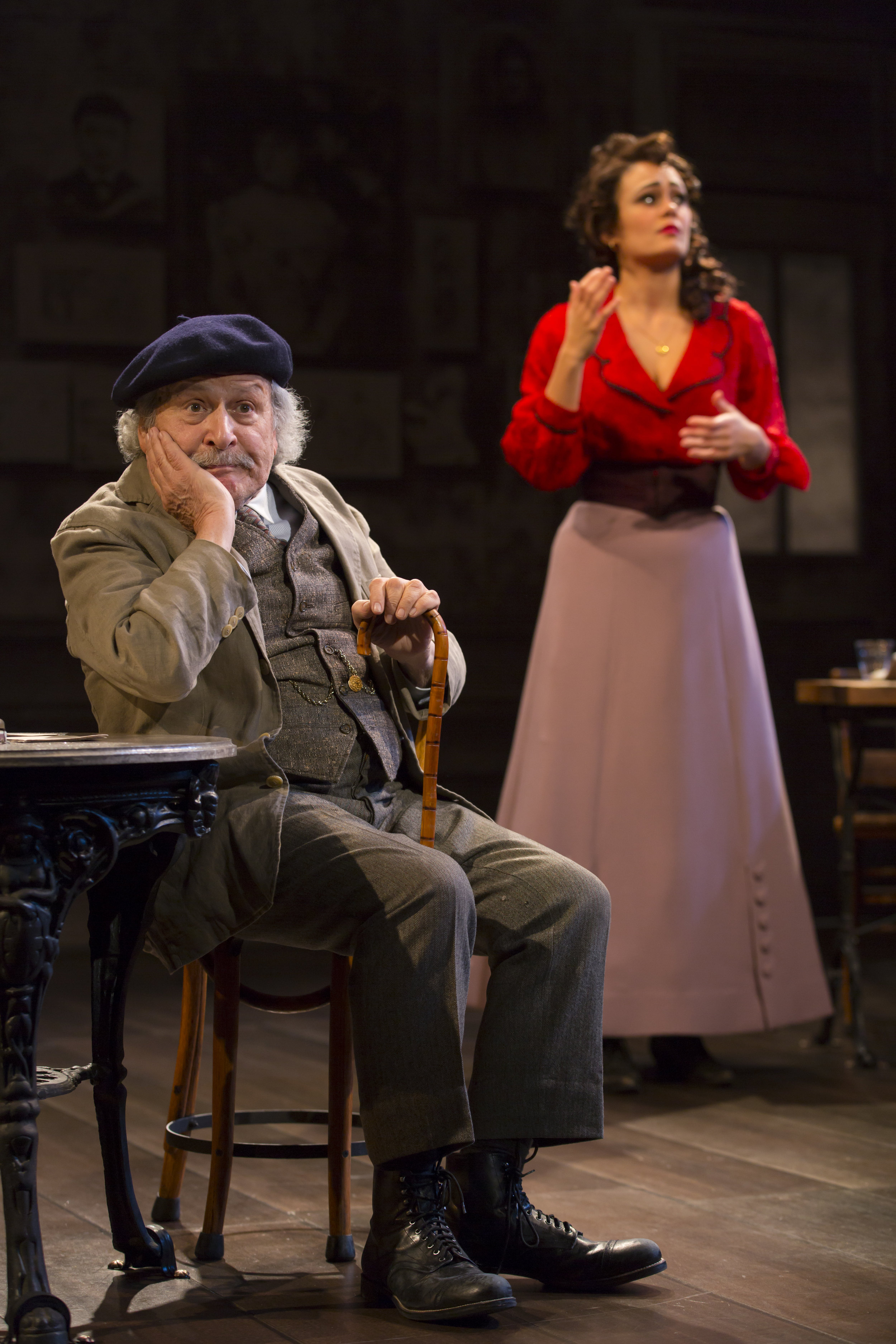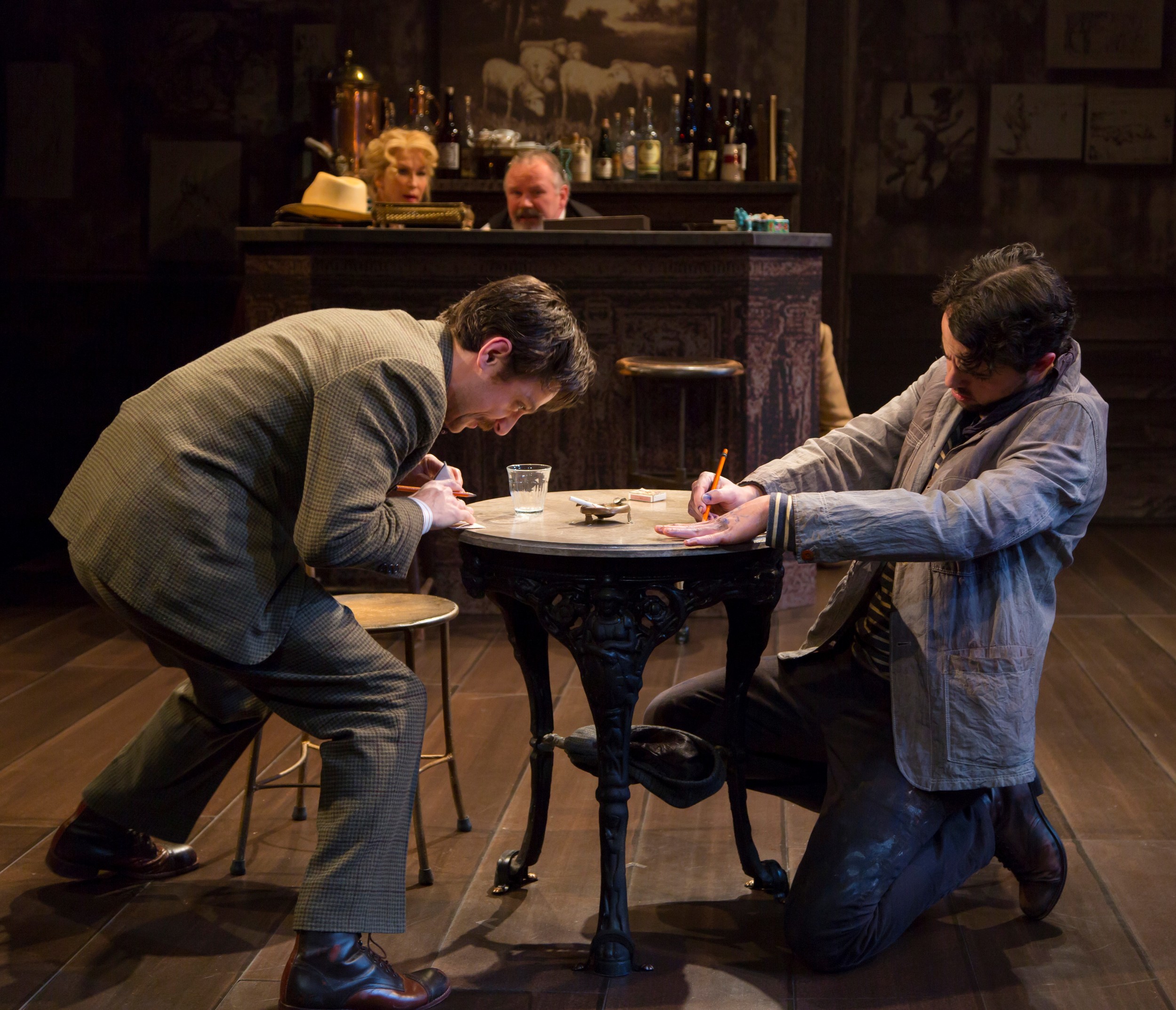Review of The Most Beautiful Room in New York, Long Wharf Theatre
The promise of the new musical The Most Beautiful Room in New York, in its premiere at the Long Wharf Theatre, directed by Artistic Director Gordon Edelstein, is a tuneful look at the rigors of sustaining a beloved Union Square restaurant in these days of rampant greed and bad taste. Adam Gopnik, a well-known New Yorker author, provides the book and lyrics, and should have a take on New York restaurant culture to entertain and enlighten, particularly as he’s also the author of The Table Comes First: Family, France, and the Meaning of Food. With music by composer David Shire, who once upon a time composed the soundtrack for the very gritty New York caper-fable The Taking of Pelham One Two Three, we should be transported to a piquant urban ambiance. Not quite. This battle for the soul of a mom-and-pop eatery offers a main entrée with too much filler, and really only tastes satisfyingly urban in its side-dishes.
The cast of The Most Beautiful Room in New York (photo: T. Charles Erickson)
David (Matt Bogart, stepping into the role late in the run-up to opening and providing a likeable heart of the story) is the chef and co-owner of “Table,” a small, successful restaurant. Presented as a dreamer, by his more practical wife and business partner Claire (Anastasia Barzee), David’s a “poet” of the food industry who tilts at windmills. He believes he’s solved the problem of the huge mark-up in rent that will otherwise put him out of business: a deal with the devil, sort of. The “devil,” in this case, is the long-haired, rock star of a chef named Sergio (Constantine Maroulis, also likeable though supposed to be dastardly) who has his own agenda. Once “brothers” in their early years of trying to make a name in the food business, Sergio has long since surpassed David in the earning ability of his brand. But he’s always looking for new territory to exploit. Thus comes the Faustian bargain, served up by an entertaining duet “Take My Life.”
David (Matt Bogart), Sergio (Constantine Maroulis) (photo: T. Charles Erickson)
If that were all, that might be enough, particularly as “Market Forces,” sung by Phoebe (Darlesia Cearcy), one half of a lesbian couple that manages the co-op farmer’s market in the Square, is one of the best songs delivered by one of the show’s best singers. Maybe we will be treated to a musical unmasking of how capitalism foils all but the most bread-winning choices. Unfortunately, Phoebe’s musings are merely a side-dish. As is the other delicious touch: Mark Nelson’s very welcome comic turn as the proprietor of Carlo’s Anarchist Pizza, a Bensonhurst establishment where each slice is viewed as an individual pie, making the solidarity of each pizza stronger. Carlo is introduced fairly early on, when David and Claire’s son Bix (Tyler Jones, playing a more wholesome version of a Spielberg teen) delivers some fresh mozz. We might for a moment contemplate a musical world filled with off-beat eateries catering to varied political and gustatory manifestos, but this isn’t that show, though Michael Yeargan’s masterful, flavorful sets might keep you hoping.
Anna (Krystina Alabado), Carlo (Mark Nelson) (photo: T. Charles Erickson)
Instead, it’s a romance. Middle-aging-ish romance served up with jealousy—that eternal spice of the tried-and-true. David realizes that Claire had a weekend that shall evermore remain legendary . . . in Wildwood, New Jersey, with Sergio. Sergio, though jaded by his conquest of the world, or at least the media, can’t seem to get past their night in the fabled “Doo Wop Motel.” If this sounds preposterous, well, it is a musical. The will-she, won’t-she plot line does nothing to help the restaurant story, but it does make that “most beautiful room” seem built on airy nothings. We have to accept that Claire is bored enough with it all, including a teen son courting Anna (Krystina Alabado), the daughter of Carlo, to take up with a sleazy wheeler-dealer who talks like Trump and looks like Bono (indeed, Maroulis hints at being a belter à la Sir Vox, but never really gets to show off the pipes here). Phoebe, always on hand to offer colorful asides, opines that “straight women” almost always prefer the pirate to the poet, and that should be good enough for motivation.
Bix (Tyler Jones), Kate (Sawyer Niehaus), Claire (Anastasia Barzee) (photo: T. Charles Erickson)
Act Two is shorter than Act One and if the romantic interests grip you, you’ll be satisfied as the plot plays out. For me, songs four—the title song, a lovely duet between David and his daughter Kate (Sawyer Niehaus)—through eight, a charming little riff on the current teen generation, “So, Like, Maybe”—are the best stuff in the show, which includes “Take My Life,” “Market Forces,” and Carlo’s “Espresso!” All of which arrive before the love triangle rears its hoary head. Carlo comes back in Act Two—thankfully!—with the nicely turned “Slice of Life,” but Phoebe and her partner Gloria (Danielle Ferland) try rather doggedly, in “Lucky,” to poke fun at the ideals of marriage.
Through it all, our central family—and they have plenty of songs to prove it—remains so bland we can’t help but wonder if maybe the surly diner Gabe (Allan Washington, another spot-on side) is onto something: pass the hot sauce!
À chacun son goût.
The cast of The Most Beautiful Room in New York (photo: T. Charles Erickson)
The Most Beautiful Room in New York
Music by David Shire
Book & Lyrics by Adam Gopnik
Directed by Gordon Edelstein
Musical Staging: John Carrafa; Music Director & Supervisor: John McDaniel; Orchestration: Jonathan Tunick; Additional Musical Arrangements: John McDaniel; Set Design: Michael Yeargan; Costume Design: Jess Goldstein; Lighting Design: Christopher Akerlind; Sound Design: Keith Caggiano; Associate Music Director: Jesse Kissel; Associate Choreographer: Jenn Rapp; Production Stage Manager: Linda Marvel; Assistant Stage Manager: Amy Patricia Stern; Casting by Calleri Casting
Cast: Krystina Alabado, Anastasia Barzee, Matt Bogart, Darlesia Cearcy, Ryan Duncan, Danielle Ferland, Anne Horak, Tyler Jones, Constantine Maroulis, Mark Nelson, Sawyer Niehaus, Allan Washington
Musicians: Conductor/Keyboard 1: John McDaniel; Keyboard 2: Jesse Kissel; Trumpet: Dan Duncan; Reed 1: Tim Moran; Reed 2: Andrew Studenski; String Bass/Electric: Dave Daddario; Drums/Percussion: Ed Fast
The Long Wharf Theatre
May 3-28, 2017
















